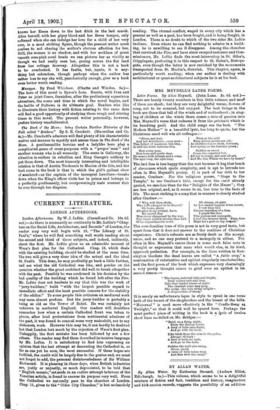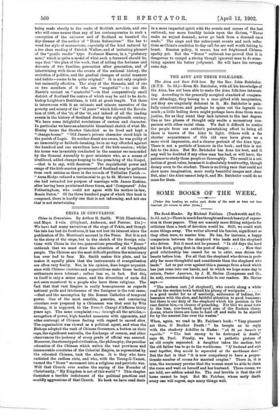BY ALLAN WATER.
By Allan Water. By Katherine Steuart. (Andrew Elliot, Edinburgh. 6s.)—This volume, which seems to be a delightful mixture of fiction and fact, tradition and history, imagination and kirk-session records, suggests the possibility of an addition being made shortly to the ranks of Scottish novelists, and one who will come nearer than any of her contemporaries to such a conception of the universe and of Scotland as haunted the day-dreams of the author of " Horae Subsecivae.'' She has to weed her style of mannerisms, (specially of the kind induced by a too close reading of Patrick Walker, and of irritating phrases of the "gentle reader" type. Professor Masson, in a." prefatory note," which is quite a model of what such a foreword should be, says that "the plan of the work, that of telling the fortunes and descents of two families, generation after generation, and of intertwining with these the events of the national history, the wvolution of politics, and the gradual changes of social manners and habits—seems to be quite original." It is not only originaL but eminently effective. The story of the Steuarts, and of one or two members of it who are " magerful"— to use Mr. Barrie's variant on " masterful "—in that comparatively small district of Scotland the centre of which may be said to be Arch- bishop Leighton's Dunblane, is told at great length. Yet there is interwoven with it an intimate and minute narrative of the poverty and misery of the "ill years " which followed the Revolu- tion of 1888, of the '15, of the '45, and indeed of all the leading events in the history of Scotland during the eighteenth century. We have some delightful revelations of custom and character. In particular we have an admirable thumbnail sketch of what Mr. Henley terms the Shorter Catechist as he lived and kept a " change-house." " Old James's private character stood high in the parish of Logie. He neither drank nor swore, he was guilty of no immorality or Sabbath.breaking, he in no way offended against the hundred and one unwritten laws of the kirk-session ; whilst his house was invariably conducted in the manner recommended by the General Assembly to poor ministers who, as a means of livelihood, added change-keeping to the preaching of the Gospel, —that is to say, with decorum." The inquisitorial power and range of the kirk-session government of Scotland may be gathered from such entries as these in the records of Talliallan Parish :- "Anna Hodge refused a testimonial to go to St. Mirian's because she had retracted her purpose of marriage with James Erskine, after having been proclaimed three times, and Compeared' John Fotheringham, who could not agree with his mother-in-law, Bessie Paton." Of the three hundred pages of which this book is composed, there is hardly one that is not informing, and not one that is not entertaining.











































 Previous page
Previous page